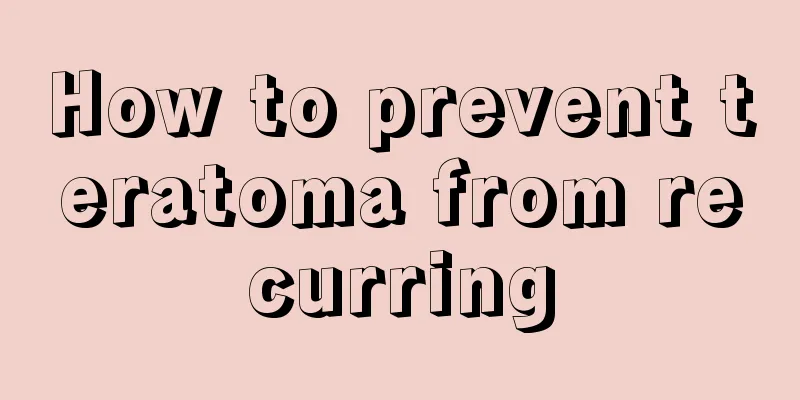How to prevent teratoma from recurring

|
Once a teratoma is diagnosed, early surgical resection is necessary to avoid the malignant transformation of benign teratoma due to delayed surgery, and to prevent infection, rupture, bleeding and complications of the tumor. The key point of teratoma surgery is to completely remove the tumor. Ovarian and testicular tumors are all treated by unilateral ovarian or testicular resection. Sacrococcygeal teratoma emphasizes that the coccyx must be removed at the same time to avoid residual pluripotent cells and tumor recurrence. So how should we prevent recurrence? 1. Physical examination or gynecological examination, pelvic B-ultrasound. The best way to find teratoma is through ultrasound examination (ultrasound examination [translation]: it is to observe the reflection of ultrasound by the human body, and to irradiate weak ultrasound to the body and image the reflected waves of the tissue.). 2. Acute abdominal pain. Ovarian teratoma may cause ovarian torsion and necrosis, which manifests as severe pain and corresponding local symptoms. If the teratoma is secondary infected and has intracystic bleeding, it can often rapidly increase in size, with obvious local tenderness, accompanied by fever, anemia, shock and other symptoms. 3. Menstrual abnormalities. Teratoma may cause menstrual abnormalities, such as irregular cycles, heavy or light menstruation. 4. Discovered during cesarean section. For some obese or pregnant people, it is not easy to find teratomas during B-ultrasound. Therefore, some women find teratomas in their abdomen during cesarean section, and the doctor will remove the teratoma. 5. Discovery of long-term infertility examination. Some women have been infertile for many years after marriage, and only found out that it was teratoma when they went to the hospital for examination. 6. Feeling a bulge. Some people's teratomas have grown very large, with a big belly. Young women think they are "accidentally pregnant" and older women think they are gaining weight. Once they go to the hospital for a checkup, the disguised teratoma is exposed. After undergoing teratoma surgery, women should avoid eating greasy food, because the accumulation of fat will prevent the wound from healing quickly and weaken the resistance to bacteria. The protein intake can be appropriately increased, as protein can help the wound heal quickly and increase physical strength. Fish is a good choice because fish meat is easier to digest and absorb. |
<<: What are the principles of exercise for people with teratoma
>>: Are ovarian tumors contagious?
Recommend
How to prevent the occurrence of bone cancer
How to prevent the occurrence of bone cancer? Bon...
What to do if prostate cancer enlargement presses on the bladder? The harm of prostate cancer enlargement to the body
Nowadays, many middle-aged and elderly people suf...
How is hepatoblastoma caused
Hepatoblastoma is the most common liver tumor in ...
What to eat for uterine cancer
Early stage uterine cancer has little effect on d...
The cost of treating small cell lung cancer
What is the cost of treating small cell lung canc...
Can drinking milk relieve stomachache? Expert answer
Nowadays, people's lives are irregular, which...
How to treat axillary tinea
Axillary ringworm is more common in areas with mo...
Is constipation a symptom of cervical cancer? What are the causes of cervical cancer?
Can constipation be a symptom of cervical cancer?...
Two types of people who drink alcohol are most likely to get liver cancer
Liver cancer is one of the common malignant tumor...
How to treat long-term urinary pain?
Painful urination is a common condition that can ...
Can you still get pregnant if you have an ovarian tumor
Ovarian tumors can be benign or malignant. Two-th...
How to remove the hair in the buttock groove
For normal people, when they enter puberty, pubic...
Why can traditional Chinese medicine treat gastric cancer
It is unlikely that patients with advanced gastri...
The role and efficacy of white vinegar and salt
Many people want their faces to be especially ten...
What will happen if nasopharyngeal cancer is not treated?
What happens if nasopharyngeal cancer is not trea...









